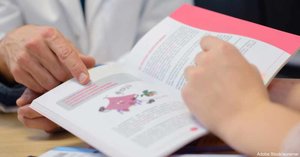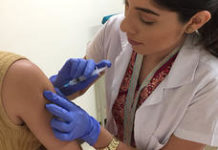The National Institutes of Health recommend that educational materials related to medical conditions and treatments should not surpass a 7th or 8th-grade reading level in order to help as many people as possible fully understand their diseases and treatment options. However, a recent study shows that much of the chemotherapy-related literature available surpasses this level, leading to a lack of comprehension among patients.The study, published in the Journal of Cancer Education, evaluated the format and readability of five commonly used chemotherapy pamphlets (either online or printed). They also contacted patients of the South Carolina Oncology Associates (SCOA) clinic to evaluate their perceptions of the usefulness of these materials. Photo: Adobe Stock/auremar
Photo: Adobe Stock/auremar
The 46 participants were all newly diagnosed adult women with breast cancer and spoke English fluently. Their median age was 59 years, and all had graduated high school, with about half also having graduated from a four-year college. Their health literacy was determined to be above a 9th-grade level. All the participants were involved in a nurse educator-led educational session prior to starting chemotherapy.Researchers determined that all of the literature they’d picked to study was “superior” in terms of content but high in terms of reading level. All the materials required at least a 9th-grade reading level, while some required 12th-grade literacy or even higher. Educational booklets from SCOA, Susan G. Komen, and Breastcancer.org were among the most difficult to read. That meant that many of the patients evaluated were unable to fully comprehend the material related to their care. Participants reported finding a sense of control in learning, making it particularly vital that chemo materials be readable. Photo: Adobe Stock/auremar
Photo: Adobe Stock/auremar
The study also revealed that much of the literature lacked illustrations to aid understanding and culturally appropriate pictures and information to represent the women the literature was presented to.Educational medical literature is considered a critically important component of treatment for breast cancer patients undergoing chemotherapy, but if patients are unable to comprehend the material, the literature is no longer useful. More research on the way women interact with chemotherapy education is needed, but the researchers hope their work will encourage the creators of such literature to keep their audience’s reading levels in mind.As a result of the study, researchers also recommend that nurse educators supplement their reading materials with visual aids like photos and videos. They added that “nurse educators need to evaluate the reading level of the materials and patients’ level of health literacy skills to determine if any potential gaps could exist in learning.” Share on Facebook
Source
Home World News Study Says Educational Materials for Chemo Often Require Higher Reading Level than...








